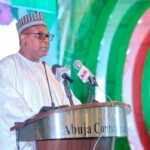In a bid to address Nigeria’s significant metering deficit, the Federal Government, in collaboration with the Nigerian Sovereign Investment Authority (NSIA), has allocated N1.325 trillion to fund the Presidential Metering Initiative (PMI).
The initiative aims to bridge the nation’s staggering seven million metering gap within a targeted timeframe of four to five years.
During a site visit to the Famadec Group in Lagos, Adebayo Adelabu, Minister of Power, unveiled the substantial commitments made towards the initiative.
He disclosed that the Government has allocated an initial N75 billion as seed capital, with plans to leverage debt financing from various financial institutions to bolster the PMI’s resources.
”Additionally, the NSIA has pledged to inject a minimum of N250 billion annually for the duration of the initiative, enhancing the sector’s capacity to execute its meter acquisition strategy,” he stated.
Adelabu emphasized the importance of the PMI in closing the metering gap and outlined the establishment of the Presidential Metering Council (PMC), which he chairs.
The PMC includes key stakeholders such as the Senior Advisor to the President on Energy and representatives from the private sector.
”Nigeria currently faces a deficit of over seven million electricity meters, leading to issues such as estimated billing, revenue leakage, and consumer dissatisfaction.,” the minister lamented.
Adelabu underscored the necessity of closing the gap and highlighted the constrained production capacities of meter manufacturing facilities due to insufficient demand.
He expressed optimism that increased patronage would stimulate growth in the manufacturing sector, enabling facilities to expand operations significantly and address the nation’s metering deficit.
Adelabu emphasized the importance of a mix of imported and locally manufactured meters to meet Nigeria’s metering needs, particularly in addressing immediate demands while supporting the growth of local manufacturers.
Recall that Adelabu recently expressed concern about Nigeria’s suboptimal performance of all 10 Independent Power Plants (IPPs), revealing that they operate at less than 15 per cent capacity.
During the electricity and energy access session at the Nigeria International Energy Summit in Abuja, the minister acknowledged the challenges faced in the power sector.
He lamented that the inadequate power supply was hindering citizens from enjoying a good quality of life.










